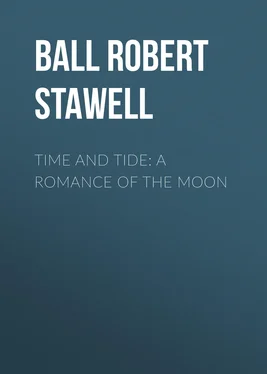Robert Ball - Time and Tide - A Romance of the Moon
Здесь есть возможность читать онлайн «Robert Ball - Time and Tide - A Romance of the Moon» — ознакомительный отрывок электронной книги совершенно бесплатно, а после прочтения отрывка купить полную версию. В некоторых случаях можно слушать аудио, скачать через торрент в формате fb2 и присутствует краткое содержание. Жанр: foreign_antique, Физика, foreign_edu, на английском языке. Описание произведения, (предисловие) а так же отзывы посетителей доступны на портале библиотеки ЛибКат.
- Название:Time and Tide: A Romance of the Moon
- Автор:
- Жанр:
- Год:неизвестен
- ISBN:нет данных
- Рейтинг книги:5 / 5. Голосов: 1
-
Избранное:Добавить в избранное
- Отзывы:
-
Ваша оценка:
- 100
- 1
- 2
- 3
- 4
- 5
Time and Tide: A Romance of the Moon: краткое содержание, описание и аннотация
Предлагаем к чтению аннотацию, описание, краткое содержание или предисловие (зависит от того, что написал сам автор книги «Time and Tide: A Romance of the Moon»). Если вы не нашли необходимую информацию о книге — напишите в комментариях, мы постараемся отыскать её.
Time and Tide: A Romance of the Moon — читать онлайн ознакомительный отрывок
Ниже представлен текст книги, разбитый по страницам. Система сохранения места последней прочитанной страницы, позволяет с удобством читать онлайн бесплатно книгу «Time and Tide: A Romance of the Moon», без необходимости каждый раз заново искать на чём Вы остановились. Поставьте закладку, и сможете в любой момент перейти на страницу, на которой закончили чтение.
Интервал:
Закладка:
There is the greatest difference between the height of the rise and fall of the tide at different localities. Out in mid-ocean, for instance, an island like St. Helena is washed by a tide only about three feet in range; an enclosed sea like the Caspian is subject to no appreciable tides whatever, while the Mediterranean, notwithstanding its connection with the Atlantic, is still only subject to very inconsiderable tides, varying from one foot to a few feet. The statement that water always finds its own level must be received, like many another proposition in nature, with a considerable degree of qualification. Long ere one tide could have found its way through the Straits of Gibraltar in sufficient volume to have appreciably affected the level of the great inland sea, its effects would have been obliterated by succeeding tides. On the other hand, there are certain localities which expose a funnel-shape opening to the sea; into these the great tidal wave rushes, and as it passes onwards towards the narrow part, the waters become piled up so as to produce tidal phenomena of abnormal proportions. Thus, in our own islands, we have in the Bristol Channel a wide mouth into which a great tide enters, and as it hurries up the Severn it produces the extraordinary phenomenon of the Bore. The Bristol Channel also concentrates the great wave which gives Chepstow and Cardiff a tidal range of thirty-seven or thirty-eight feet at springs, and forces the sea up the river Avon so as to give Bristol a wonderful tide. There is hardly any more interesting spot in our islands for the observation of tides than is found on Clifton Suspension Bridge. From that beautiful structure you look down on a poor and not very attractive stream, which two hours later becomes transformed into a river of ample volume, down which great ships are navigated. But of all places in the world, the most colossal tidal phenomena are those in the Bay of Fundy. Here the Atlantic passes into a long channel whose sides gradually converge. When the great pulse of the tide rushes up this channel, it is gradually accumulated into a mighty volume at the upper end, the ebb and flow of which at spring tides extends through the astonishing range of not less than fifty feet.
These discrepancies between the tides at different places are chiefly due to the local formations of the coasts and the sea-beds. Indeed, it seems that if the whole earth were covered with an uniform and deep ocean of water, the tides would be excessively feeble. On no other supposition can we reasonably account for the fact that our barometric records fail to afford us any very distinct evidence as to the existence of tides in the atmosphere. For you will, of course, remember that our atmosphere may be regarded as a deep and vast ocean of air, which embraces the whole earth, extending far above the loftiest summits of the mountains.
It is one of the profoundest of nature's laws that wherever friction takes place, energy has to be consumed. Perhaps I ought rather to say transformed, for of course it is now well known that consumption of energy in the sense of absolute loss is impossible. Thus, when energy is expended in moving a body in opposition to the force of friction, or in agitating a liquid, the energy which disappears in its mechanical form reappears in the form of heat. The agitation of water by paddles moving through it warms the water, and the accession of heat thus acquired measures the energy which has been expended in making the paddles rotate. The motion of a liquid of which the particles move among each other with friction, can only be sustained by the incessant degradation of energy from the mechanical form into the lower form of diffused heat. Thus the very fact that the tides are ebbing and flowing, and that there is consequently incessant friction going on among all the particles of water in the ocean, shows us that there must be some great store of energy constantly available to supply the incessant draughts made upon it by the daily oscillation of the tides. In addition to the mere friction between the particles of water, there are also many other ways in which the tides proclaim to us that there is some great hoard of energy which is continually accessible to their wants. Stand on the bank of an estuary or river up and down which a great tidal current ebbs and flows; you will see the water copiously charged with sediment which the tide is bearing along. Engineers are well aware of the potency of the tide as a vehicle for transporting stupendous quantities of sand or mud. A sand-bank impedes the navigation of a river; the removal of that sand-bank would be a task, perhaps, conceivably possible by the use of steam dredges and other appliances, whereby vast quantities of sand could be raised and transported to another locality where they would be innocuous. It is sometimes possible to effect the desired end by applying the power of the tide. A sea-wall judiciously thrown out will sometimes concentrate the tide into a much narrower channel. Its daily oscillations will be accomplished with greater vehemence, and as the tide rushes furiously backwards and forwards over the obstacle, the incessant action will gradually remove it, and the impediment to navigation may be cleared away. Here we actually see the tides performing a piece of definite and very laborious work, to accomplish which by the more ordinary agents would be a stupendous task.
In some places the tides are actually harnessed so as to accomplish useful work. I have read that underneath old London Bridge there used formerly to be great water-wheels, which were turned by the tide as it rushed up the river, and turned again, though in the opposite way, by the ebbing tide. These wheels were, I believe, employed to pump up water, though it does not seem obvious for what purposes the water would have been suitable. Indeed in the ebb and flow all round our coasts there is a potential source of energy which has hitherto been allowed to run to waste. The tide could be utilized in various ways. Many of you will remember the floating mills on the Rhine. They are vessels like paddle steamers anchored in the rapid current. The flow of the river makes the paddles rotate, and thus the machinery in the interior is worked. Such craft moored in a rapid tide-way could also be made to convey the power of the tides into the mechanism of the mill. Or there is still another method which has been employed, and which will perhaps have a future before it in those approaching times when the coal-cellars of England shall be exhausted. Imagine on the sea-coast a large flat extent which is inundated twice every day by the tide. Let us build a stout wall round this area, and provide it with a sluice-gate. Open the gate as the tide rises, and the great pond will be filled; then at the moment of high water close the sluice, and the pond-full will be impounded. If at low tide the sluice be opened the water will rush tumultuously out. Now suppose that a water-wheel be provided, so that the rapid rush of water from the exit shall fall upon its blades; then a source of power is obviously the result.
At present, however, such a contrivance would naturally find no advocates, for of course the commercial aspect of the question is that which will decide whether the scheme is practicable and economical. The issue indeed can be very simply stated. Suppose that a given quantity of power be required—let us say that of one hundred horse. Then we have to consider the conditions under which a contrivance of the kind we have sketched shall yield a power of this amount. Sir William Thomson, in a very interesting address to the British Association at York in 1881, discussed this question, and I shall here make use of the facts he brought forward on that occasion. He showed that to obtain as much power as could be produced by a steam-engine of one hundred horse power, a very large reservoir would be required. It is doubtful indeed whether there would be many localities on the earth which would be suitable for the purpose. Suppose, however, an estuary could be found which had an area of forty acres; then if a wall were thrown across the mouth so that the tide could be impounded, the total amount of power that could be yielded by a water-wheel worked by the incessant influx and efflux of the tide would be equal to that yielded by the one hundred horse engine, running continuously from one end of the year to the other.
Читать дальшеИнтервал:
Закладка:
Похожие книги на «Time and Tide: A Romance of the Moon»
Представляем Вашему вниманию похожие книги на «Time and Tide: A Romance of the Moon» списком для выбора. Мы отобрали схожую по названию и смыслу литературу в надежде предоставить читателям больше вариантов отыскать новые, интересные, ещё непрочитанные произведения.
Обсуждение, отзывы о книге «Time and Tide: A Romance of the Moon» и просто собственные мнения читателей. Оставьте ваши комментарии, напишите, что Вы думаете о произведении, его смысле или главных героях. Укажите что конкретно понравилось, а что нет, и почему Вы так считаете.












